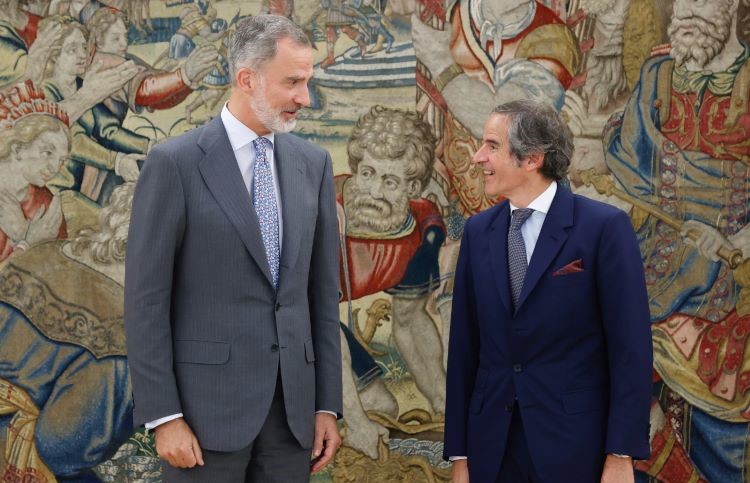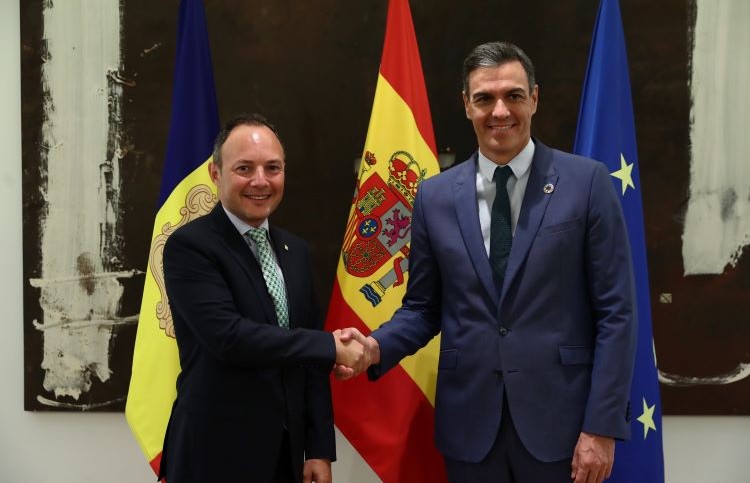The Diplomat
King Philip VI, the President of the Government, Pedro Sánchez, and the Minister of Foreign Affairs, José Manuel Albares, received in Madrid the Director General of the International Atomic Energy Agency (IAEA), Rafael Grossi, with whom they discussed the problems of the non-proliferation of nuclear weapons and the “nuclear dimension” of the Russian invasion of Ukraine.
Grossi, who is in Spain to attend the events celebrating the 25th anniversary of the Ibero-American Forum of Radiological and Nuclear Regulatory Bodies (FORO), was received last Thursday by the King at the Zarzuela Palace (in the presence of the Secretary of State for Foreign and Global Affairs, Ángeles Moreno) and met yesterday morning at the Moncloa Complex, with President Sánchez, with whom he discussed “the complicated geopolitical situation regarding the non-proliferation of nuclear weapons”, in a context in which, “to the difficulties to resume the Nuclear Agreement with Iran and the progress of the North Korean nuclear program, has now been added the nuclear dimension of the Russian aggression against Ukraine”, as reported by Moncloa in a press release.
The two leaders also shared their interest in allowing the return of IAEA inspectors to the Ukrainian nuclear power plant of Zaporiya, the largest in Europe, which has suffered attacks during the war, and analyzed the role that this international organization is playing in the current complex geopolitical context and the different peaceful uses of this technology.
In this sense, the President of the Government congratulated the Director General of the IAEA for the work of the organization as “a fundamental actor for nuclear non-proliferation and for the maintenance of international peace and security” and assured that Spain will continue to provide technical assistance for the development of nuclear technology for peaceful uses, especially in Latin America. For his part, according to Moncloa, Grossi underscored Spain’s constructive attitude in its collaboration with the IAEA, especially with regard to advancing the peaceful, safe and responsible uses of nuclear technology in areas such as medical, agricultural and environmental applications.
Subsequently, Grossi was received by José Manuel Albares, who showed his support for the IAEA’s work to ensure the so-called “seven pillars of nuclear safety” at nuclear facilities in Ukraine following the Russian invasion of that country. Spain has responded to the IAEA’s call to strengthen such monitoring with an extraordinary contribution of 250,000 euros.
Albares and Rafael Grossi reviewed the main international dossiers on non-proliferation and nuclear safety. With regard to Iran’s nuclear program, the Minister reiterated Spain’s support for the recovery of the Joint Comprehensive Plan of Action and recalled the need for Teheran to collaborate with the IAEA to clarify all the doubts raised by the discovery of nuclear material in undeclared facilities.
The Minister of Foreign Affairs told the Director General that, on the occasion of the tenth Non-Proliferation Treaty Review Conference, Spain will once again support the central role of the IAEA in the fight against nuclear proliferation. He also highlighted the Agency’s work in promoting the peaceful uses of nuclear technology in areas such as agriculture, health and environmental management.
Spain contributes around eight million euros annually to the IAEA’s regular budget. Apart from that, Spain made voluntary contributions in 2021 of around €2.75 million to the Technical Cooperation Fund, the Physical Security Fund, the Spanish Safeguards Support Program and the Marie Sklodowska-Curie Fellowship Program. Our country also collaborates with the IAEA through the Ibero-American Forum of Radiological and Nuclear Regulatory Agencies, whose 25th anniversary was celebrated yesterday in Madrid.







